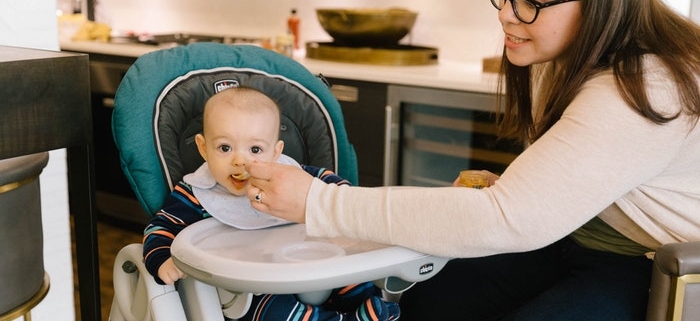When You Should Stop Spoon-Feeding Your Kid
Here’s When You Should Stop Spoon-Feeding Your Kid, According To Experts
By Ojus Patel
You’ve been waiting to hit the solid foods milestone so you can finally feed your sweet babe teeny spoonfuls of something delicious, but the recommendations vary on when and how to start feeding your baby real food, and they pretty much vary on when you should stop, too. Because kids are so different, and their needs are all different, there’s no real solid guidelines on how mealtimes should go with your toddlers. But, there are general routines you can follow to help your kid learn to eat in a healthy way. Here’s when you should stop spoon-feeding your kid, so you can plan accordingly.
“Once a baby can hold his head properly and sit up comfortably, at around 8 to 12 months, a baby should start using his/her thumb or index fingers to feed themselves,” Dr. Katia Friedman tells Romper. By that time, your child should have developed hand-eye coordination and related skills (like the pincer grasp) to be able to feed themselves appropriately. Obviously, development varies from child to child, but stopping spoon-feeding and allowing a baby to try on their own will help to advance their skills. As they say, practice makes you better. If your baby is reaching for your veggies or his eyes are focused on your food, that’s a good sign that the baby is ready to start feeding themselves, notes Friedman.
Self-feeding skills, like other natural developmental skills, need to be practiced. When your baby first starts feeding themselves, complete inaccuracy (and total mess) is to be expected. As they get more and more experienced using their hands and fingers, manipulating utensils, and drinking from a cup, they’ll become more confident and more efficient. Encouraging your little ones and allowing them lots of chances to explore food and self-feeding is not only a really fun process, but also excellent for their development.
Having your baby sit with your family during mealtimes gives them a great guide for how adults eat, too. From watching you, they learn the process of a meal, how utensils are used, and how to bring food to your mouth to chew. Many families love sharing some of the family meal with their babies to give them a chance to explore flavors and textures, and discover new sensations involved in eating.
Babies are often ready to do this way before we let them. But, watching your baby learn to eat and enjoy the foods you do is one of the best moments of parenthood, particularly if mealtimes are celebrated in your family.
To view the original article on Romper CLICK HERE



